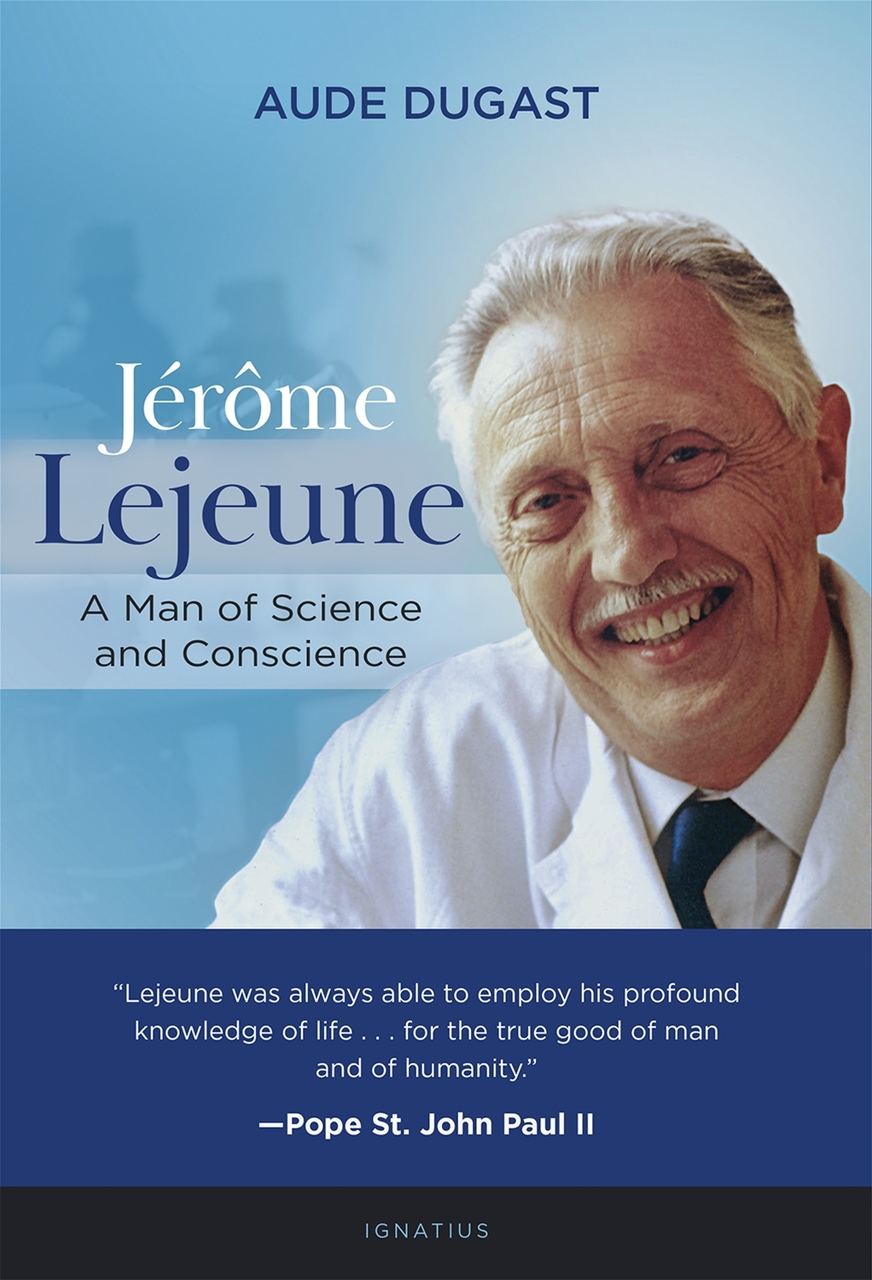
Carol S. Bannon reviews Aude Dugast's biography of the Catholic scientist who made groundbreaking discoveries about Down Syndrome.
When compiling information to write a biography encompassing the accomplishments and life of a person, the writer has to use many sources. Fortunately for us, Aude Dugast, author of Jérôme Lejeune, a Man of Science and Conscience, had just that. Dugast was given access to the many letters Jérôme penned over the years about his beliefs, his thoughts on social issues and his interactions with other scientists and world leaders, especially Pope John Paul II. She combed through articles written about Jerome that heralded his work in both genetics and his work for the Catholic Church. To complete a portrait of the complete person she tirelessly interviewed people who actually lived with and worked alongside him on a daily basis.
The result of her research is a stunning profile of a Roman Catholic scientist who let God direct his life completely, no matter where it led. As many Catholics and Christians know, the road of faith is often strewn with hardships, scorn, and moments of abject rejection. The reader quickly sees Jérôme’s life was no different.

To begin her profile, Dugast showcased Jerome Lejeune’s work as a geneticist/scientist. One of his goals in life was to discover why Down Syndrome occurred in humans. Believing if he could discover the *why*, he would eventually find a cure for his patients, she carefully describes how he was able to discover the extra chromosome we now know is responsible for Trisomy 21. More importantly she describes how he was able to present it to the world and the world’s initial reception of this discovery.
In painstaking detail, Dugast shows how this groundbreaking discovery led to a break within the scientific community and the means by which Lejeune dealt with it. She does justice to his memory by carefully showcasing his strong faith as a Catholic, not only how he lived out his faith personally but the role his faith played professionally. She writes in depth on how faith influenced his interactions with other scientists around the world. Each quotation, every thought attributed to Jérôme in this book shows his complete belief in one overriding principle throughout his entire life:
Deo Juvante. With the help of God.
As the biography progresses, the reader soon discovers the flip side of Jérôme’s scientific discovery and how it came to be used for purposes that caused him great distress as a doctor and as a Christian. Dugast carefully and methodically explains the well coordinated and systematic battle fought between the 1950s and 1980s by those in politics, the media, academia and even within the Church to change society’s thinking on contraception and abortion. She uses Lejeune’s journals to walk the reader through the *process* used by those who desired to see abortion become the *norm* and *accepted*. In order to accomplish this, she used Lejuene’s own words: “ they have to first ‘destroy the Judeo-Christian civilization that places the family first.’”
As Jérôme continued to opine: “They have to attack its weakest link, and that link is the preborn child.”
Dugast faithfully describes Jérôme’s firm belief in the sanctity of all life regardless of the reciminations he faced, the lost income he experienced, and the hate he and his family had to overcome. More importantly she tenderly captures his sadness when he did not succeed in finding a cure for his patients, or in convincing others of their worth. His single greatest fear Dugast wrote was the destruction of those born different. One particular poignant and prescient quote of his after a 1969 conference in New York City captures this sadness beautifully:
“...killing children because they are not beautiful - this is the application that the great minds on the left find for cytogenetics[*]. Either we cure them, or it will be the massacre of the innocents.”
Prophetic words for sure.
Unlike today, where people of faith are mocked for commenting on scientific information, Dugast walks the reader through Lejeune’s reasoning concerning the need for faith and science to work in tandem to solve the world’s many problems. The reader comes to understand more clearly how science and faith are not only compatible but how important faith is for science to be truly understood. "Faith is an ally of science," Jérôme believed, and Dugast illustrates how even though he was publicly and physically harassed for this very belief, he also refused to retaliate in kind.
The love he bestowed on his patients, his family, his coworkers is truly inspiring but it is Jérôme's love for Our God, Our Blessed Virgin Mary, and our Church that Dugast was able to showcase and which gave true meaning to Lejeune's life. She shows he lived his life looking at the world through eyes of faith. No other book, let alone a biography, has ever moved me to tears—yet I could not read more than a few chapters without becoming overcome with emotion. How blessed is he that upon his deathbed one of his *special patients* wrote a prayer just for him:
“My God if you please, watch over 'my friend.' My family doesn’t like my looks, but he thinks I’m kind of pretty because he knows what my heart is made of.”
Read this book. You will be not only humbled, you will be changed.
[*] Cytogenetics is a branch of pathology and genetics concerned with the study of normal chromosomes and chromosome aberrations. Classical cytogenetics allows microscopic visualization of whole chromosomes in order to assess their number and structure.
Copyright 2022 Carol S. Bannon
Image: Canva Pro
About the Author

Carol Sbordon Bannon
Carol Bannon currently lives in Massachusetts with her husband. She is a wife, mother, grandmother to seven, substitute teacher, and an active supporter of the Down Syndrome Society of Rhode Island (DSSRI). Carol is the author of Handshake from Heaven and Our Family’s Christmas Elf. She and her husband love to spend time boating on Cape Cod and traveling to new harbors.


.png?width=1806&height=731&name=CatholicMom_hcfm_logo1_pos_871c_2728c%20(002).png)
Comments